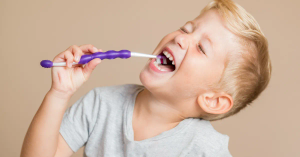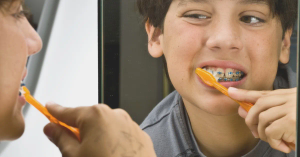As a dentist, I understand that parents often wonder if artificial teeth can truly replace natural ones, especially for children. Whether due to decay, injury, or congenital issues, kids may need dental prosthetics, commonly known as “fake teeth,” to replace missing primary teeth. But are these replacements as effective as real teeth?
What Are Fake Teeth?
Fake teeth, or dental prosthetics, are artificial replacements for missing teeth. In pediatric cases, they serve as temporary solutions to support oral health and function until permanent teeth erupt. Unlike permanent prosthetics used for adults, these are designed to support a child’s developing mouth and ensure proper chewing, speech, and facial structure.
Materials Used in Pediatric Dental Prosthetics
Pediatric prosthetics are crafted from durable, biocompatible materials:
1. Acrylic Resin: Lightweight and easy to adjust, acrylic is ideal for temporary solutions.
2. Composite Resin: This material closely matches natural tooth color and is often used for visible areas.
3. Stainless Steel Crowns: Primarily for primary molars, these are extremely durable and provide strong chewing support.
These materials are both effective and safe, allowing the prosthetic teeth to mimic the functions of natural teeth reasonably well.
Are Fake Teeth as Effective as Real Teeth?
Fake teeth for children are highly functional, but they don’t replicate natural teeth exactly. Here’s how they compare:
• Functionality: Fake teeth support chewing, speech, and facial structure, which is critical during development. While they aren’t as strong as natural teeth, they effectively fulfill a child’s needs.
• Aesthetics: With materials like composite and acrylic, fake teeth closely resemble natural teeth in appearance, helping maintain a child’s smile and confidence.
• Durability: Pediatric prosthetics are durable enough for daily use but designed to be temporary, as children’s mouths are still growing.
When Should Children Use Fake Teeth?
Fake teeth are often recommended for children when:
• A primary tooth is lost prematurely, impacting the child’s ability to eat or speak.
• Maintaining space is crucial for the proper alignment of emerging permanent teeth.
• There is a need to support jaw and bone development or prevent potential alignment issues.
Dentists will evaluate each child’s specific situation. Sometimes, a simple space maintainer might be enough if the child is close to getting permanent teeth.
Benefits Beyond Aesthetics
Fake teeth serve practical purposes that go beyond appearance:
1. Speech Support: Missing teeth, particularly front teeth, can interfere with clear pronunciation, and prosthetics help maintain normal speech patterns.
2. Efficient Chewing: Proper chewing is essential for digestion and nutrition, and fake teeth help children eat comfortably.
3. Jaw and Facial Support: Prosthetics help prevent structural changes in the jaw, supporting facial symmetry and overall growth.
4. Space Maintenance: They help preserve space for permanent teeth, reducing the risk of crowding or misalignment.
Caring for Fake Teeth
Caring for pediatric dental prosthetics is important for their longevity and function:
• Daily Cleaning: Brush fake teeth as you would natural teeth to avoid plaque buildup.
• Avoid Hard Foods: Limiting hard or sticky foods can prevent damage to the prosthetic.
• Routine Check-ups: Regular dental visits ensure that the prosthetic remains in good condition and fits properly as the child grows.
• Use Fluoride Toothpaste: This protects any remaining natural teeth, especially if decay was the reason for the prosthetic.
Conclusion
While fake teeth may not completely replicate the qualities of natural teeth, they play a vital role in supporting a child’s oral health and development. Pediatric dental prosthetics help maintain function, alignment, and appearance until permanent teeth arrive, making them a valuable solution for certain dental needs. However, fake teeth for children should only be used under a dentist’s recommendation, as each child’s case is unique. With proper care and regular dental check-ups, these prosthetics can help keep young smiles bright, healthy, and full of confidence.








